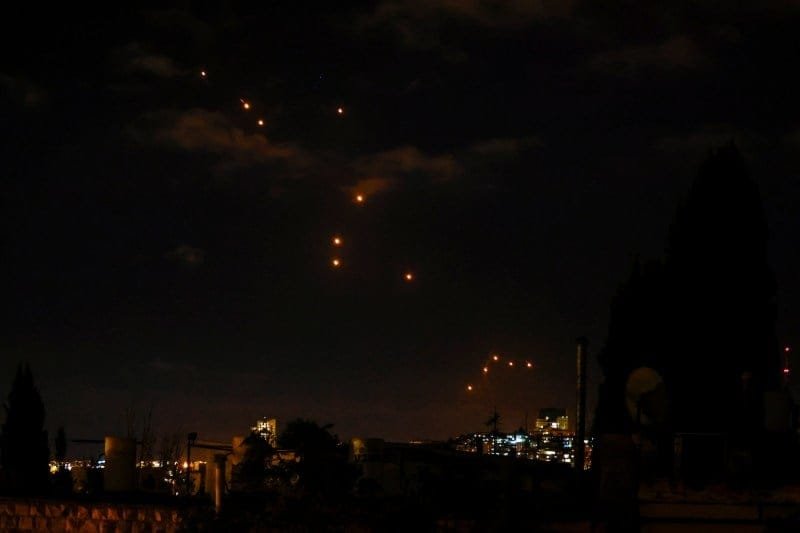Table of Contents
October 1, 2024 marked the Middle East lurch into potentially dangerous escalation when Iran launched over 180 ballistic missiles against Israel. It is a serious landmark in longstanding rivalry between the two. Both countries have hinted and threatened each other with even more revenge strikes. Threats come from Israeli Prime Minister Benjamin Netanyahu, who pledged to make Iran “pay” for the attack, which enhances fears of a wider conflict in the region.
Missile Strike: The New Chapter of Iran-Israel Conflict
Iran fired a missile barrage, that included hypersonic Fattah missiles, in response to the killing of top Iranian and Hezbollah leaders: Hassan Nasrallah and Ismail Haniyeh. Rockets fell into populated areas in central and southern Israel after being launched from Lebanon at military installations. Explosions were reported across major cities including Tel Aviv, sending civilians scurrying for bomb shelters; no significant casualties were reported in Israel.

Most of the missiles were intercepted by Israel’s high-tech, US- infused military support-iron dome defense system. Israeli Defense Forces quoted Rear Admiral Daniel Hagari of the IDF as stating that most of the projectiles were neutralized, except for minor damage to infrastructure- a school in Gadera.
Netanyahu’s Tough Response: “Iran Will Pay
Israel’s Prime Minister Netanyahu was uncompromising in a televised address: “Iran made a big mistake tonight, and it will pay for it.” He emphasized that Israel would strike at the time and place of its choosing, which heightened fears of a larger military response to targets within Iran.

He also appealed to Israeli citizens to remain steadfast in the face of what he called a campaign against “Iran’s axis of evil.” A Mideast expert said that the Israeli government has, in general, taken a careful approach to Iranian provocations in the past, but the size of this missile attack may warrant a more aggressive response.
International Response: Fear of Escalating War
International responses have been swift. The United States, long an ally of Israel, was among the first to denounce Iran’s missile attacks and pledge support for Israel in case it decides to retaliate. U.S. military assets, such as Navy warships, were moved into intercepting some of the missiles coming toward Israel. National Security Adviser Jake Sullivan warned Iran faced “severe consequences” over this escalation
Iran said that any Israeli attack would unleash “devastating destruction” over Israel and pledged to strike regional allies of Israel, including U.S. military bases in the region
The United Nations immediately called for a de-escalation of the situation, with Secretary-General António Guterres appealing for an immediate ceasefire, warning the conflict could go out of hand.
Escalation in Lebanon: Hezbollah’s Role
Since the missile attack occurred at a time when the operation of Israeli forces in southern Lebanon was already underway, the attack added fuel to the intensified agitation from Hezbollah. After all, it has been conducting targeted operations in the region against the militant group backed by Iran, following the continured aggression from Hezbollah. Israeli airstrikes hit different strongholds of Hezbollah, even those near Beirut, exacerbating what already seemed like a heavy situation.
Hezbollah has threatened to continue fighting Israel, even if it loses some of its top leadership and some support from Iran. The Iranian Revolutionary Guard Corps said the missile barrage was just the start of a highly likely sustained campaign if Israel keeps on with its military actions against Lebanon
Economic Impact: Oil Prices Soar Globally
The attack had implications that went further than the military and political spheres. Global oil prices skyrocketed by 5% after missile strikes, reflecting the fear of a wider regional conflict that would disrupt oil supplies from the Middle East
As tensions continue to heighten, economic instability in global markets can be expected to follow closely along, with investors watching intently for signs of further escalation.
Conclusion: What’s Next?
As things stand, Israel and Iran are stuck in a deadly game of tit-for-tat. Netanyahu’s promise to “make” Iran “pay” for the missile barrage promises more military conflagrations in coming days. Hezbollah involvement in Lebanon and continued Iranian support to militant groups in Gaza and beyond clouds the possibility of quick resolution. As the world waits for a de-escalation, all global powers are holding their breath as the full-scale regional war that is being dangled in the air hangs threateningly above. The next few days will be telling as Israel weighs its responses. International pressure is mounting for restraint as the scale of attack is bound to prick Netanyahu’s conscience into fulfilling his promise of retribution.
For Latest News Updates Click Here
